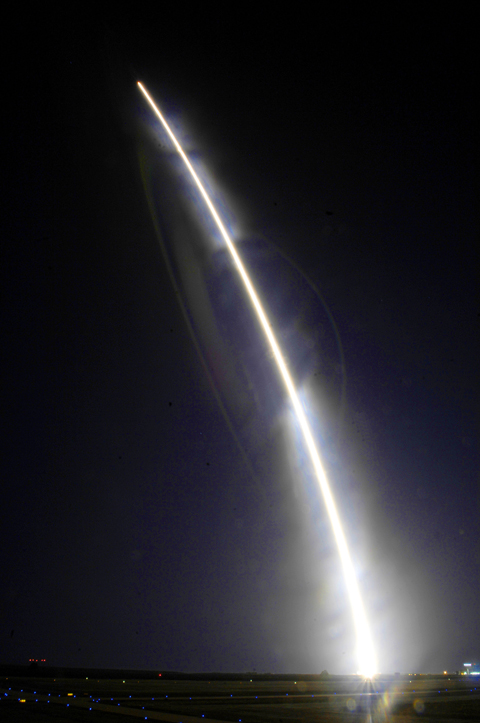A new satellite to track the chief culprit in global warming crashed into the ocean near Antarctica after launch on Tuesday, dealing a major setback to NASA’s already weak network for monitoring Earth and its environment from above.
The US$280 million mission was designed to answer one of the biggest question marks of global warming: What happens to the greenhouse gas carbon dioxide spewed by the burning of coal, oil and natural gas? How much of it is sucked up and stored by plants, soil and oceans and how much is left to trap heat on Earth to worsen global warming?
“It’s definitely a setback. We were already well behind,” said Neal Lane, science adviser during former US president Bill Clinton’s administration. “The program was weak, and now it’s really weak.”

PHOTO: AP
For about a decade, scientists have complained of a decline in the study of Earth from space. NASA spent more money looking at other planets than it did at Earth in 2007. That same year, the National Academy of Sciences warned that NASA’s study of Earth “is at great risk” with fewer missions than before and aging satellites.
“We have a very weakened Earth-observing system just at a time where we need every bit of data that we could possibly get,” said Elisabeth Holland, a senior scientist at the National Center for Atmospheric Research in Boulder, Colorado.
She said NASA has fallen behind Europe in environmental satellites. Japan successfully launched a carbon dioxide tracking satellite just last month.
The NASA satellite, called the Orbiting Carbon Observatory, was meant to explain Earth’s capture of carbon dioxide, which now appears to be slowing and could accelerate global warming, said Holland, who helped write the 2006 Intergovernmental Panel on Climate Change report.
Minutes after launch on Tuesday in California, the satellite fell back to Earth near Antarctica not far from where environment ministers and scientists met on Monday to talk about climate change.
NASA officials said a protective cover on the satellite did not release and fall away and the extra weight meant the satellite could not reach orbit.
“This was going to be one of the few bright spots in the Earth-observing system for the last five years,” Holland said.
The future was starting to look better for the scientists, who had felt ignored. Last year, NASA talked about being “greener” and gave initial approval to six new Earth-observing missions. This month, the administration of US President Barack Obama put US$400 million in the stimulus program for NASA science and NASA’s science chief Ed Weiler said “it was all going to Earth sciences.”
“It’s very unfortunate that it happened just at this time when we trying to get Earth observations back on track,” said Ruth DeFries, a Columbia University professor who was part of the National Academy study team.
Until Japan’s launch, scientists have depended on land-based stations to monitor carbon dioxide at low altitudes. The Japanese probe uses a different technique to measure carbon dioxide and does so from a different orbit compared to NASA’s satellite.
Tuesday’s failure put on hold the launch of another NASA satellite, Glory, which will look at solar radiation and airborne particles that reflect and trap sunlight. That satellite will launch on the same kind of rocket, the Taurus XL.
NASA needs to figure out what went wrong before Glory is launched, Weiler said.

Drug lord Jose Adolfo Macias Villamar, alias “Fito,” was Ecuador’s most-wanted fugitive before his arrest on Wednesday, more than a year after he escaped prison from where he commanded the country’s leading criminal gang. The former taxi driver turned crime boss became the prime target of law enforcement early last year after escaping from a prison in the southwestern port of Guayaquil. Ecuadoran President Daniel Noboa’s government released “wanted” posters with images of his face and offered US$1 million for information leading to his capture. In a country plagued by crime, members of Fito’s gang, Los Choneros, have responded with violence, using car

Two former Chilean ministers are among four candidates competing this weekend for the presidential nomination of the left ahead of November elections dominated by rising levels of violent crime. More than 15 million voters are eligible to choose today between former minister of labor Jeannette Jara, former minister of the interior Carolina Toha and two members of parliament, Gonzalo Winter and Jaime Mulet, to represent the left against a resurgent right. The primary is open to members of the parties within Chilean President Gabriel Boric’s ruling left-wing coalition and other voters who are not affiliated with specific parties. A recent poll by the

TENSIONS HIGH: For more than half a year, students have organized protests around the country, while the Serbian presaident said they are part of a foreign plot About 140,000 protesters rallied in Belgrade, the largest turnout over the past few months, as student-led demonstrations mount pressure on the populist government to call early elections. The rally was one of the largest in more than half a year student-led actions, which began in November last year after the roof of a train station collapsed in the northern city of Novi Sad, killing 16 people — a tragedy widely blamed on entrenched corruption. On Saturday, a sea of protesters filled Belgrade’s largest square and poured into several surrounding streets. The independent protest monitor Archive of Public Gatherings estimated the

Irish-language rap group Kneecap on Saturday gave an impassioned performance for tens of thousands of fans at the Glastonbury Festival despite criticism by British politicians and a terror charge for one of the trio. Liam Og O hAnnaidh, who performs under the stage name Mo Chara, has been charged under the UK’s Terrorism Act with supporting a proscribed organization for allegedly waving a Hezbollah flag at a concert in London in November last year. The rapper, who was charged under the anglicized version of his name, Liam O’Hanna, is on unconditional bail before a further court hearing in August. “Glastonbury,